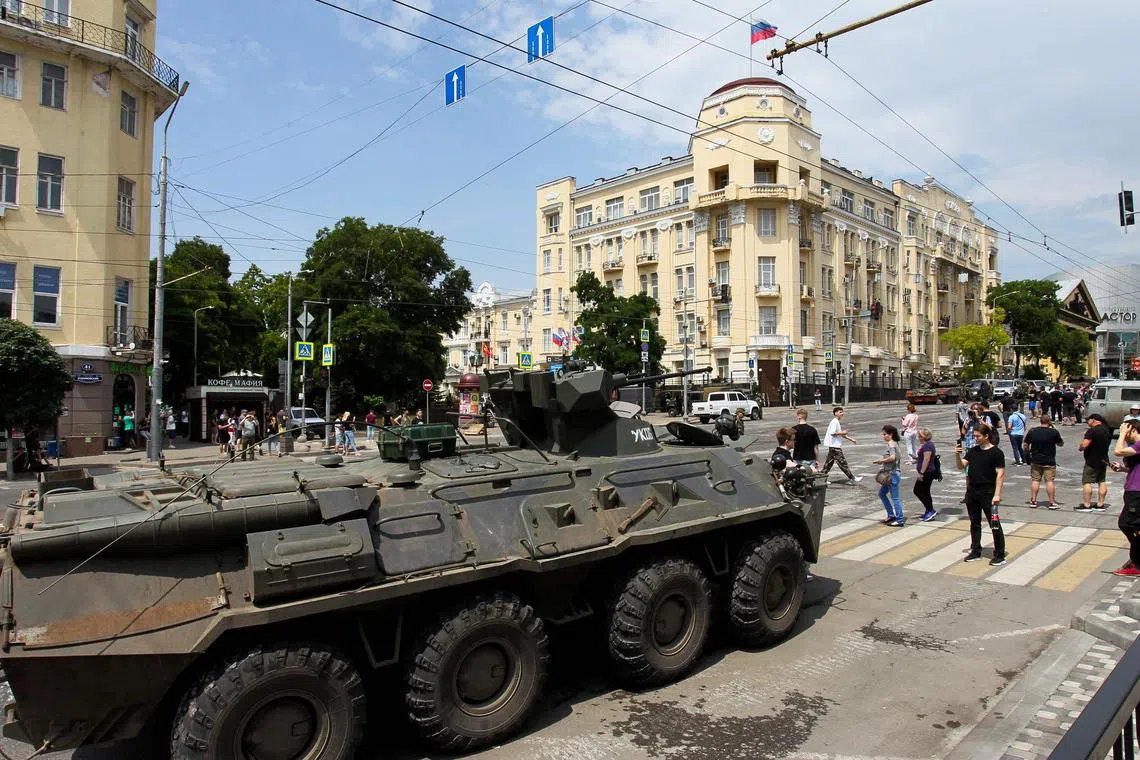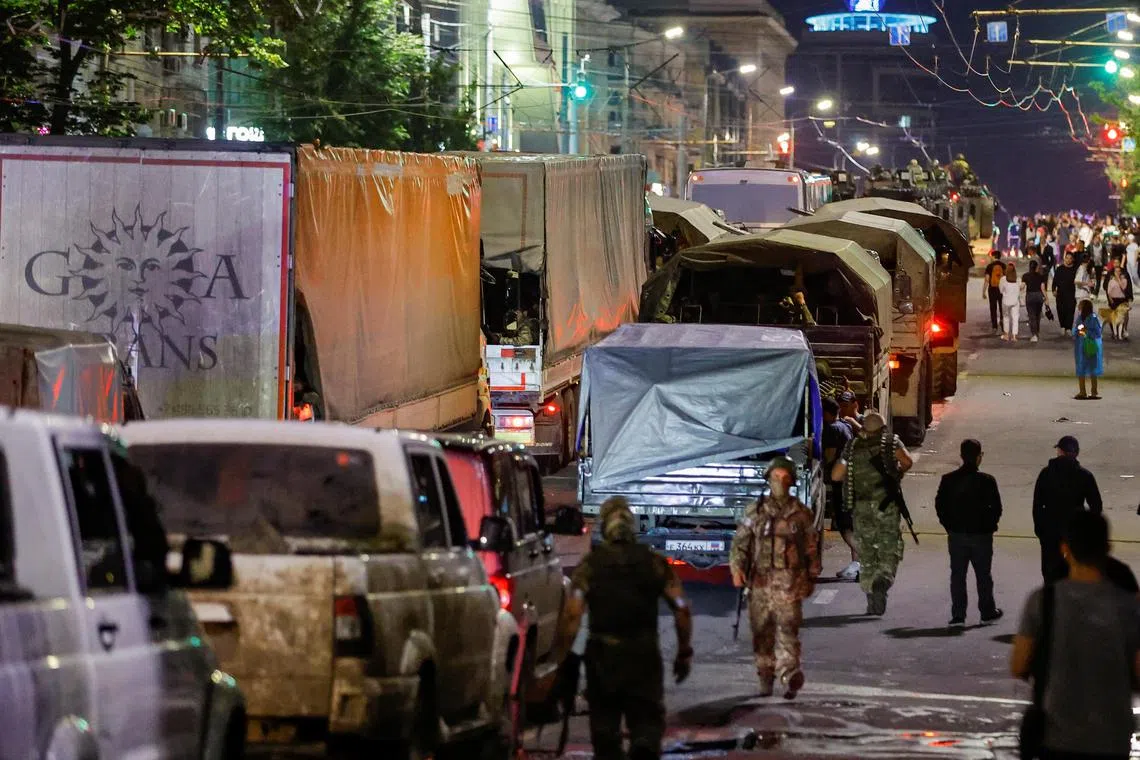What we know about Russia's Wagner mutiny
Sign up now: Get ST's newsletters delivered to your inbox

People walking past an armoured personnel carrier on Saturday in the southern Russian city of Rostov-on-Don.
PHOTO: AFP
MOSCOW - Russian President Vladimir Putin faced the most serious challenge to his long rule on Saturday when the leader of the Wagner mercenary group vowed to topple Moscow’s military leadership.
Mr Yevgeny Prigozhin, 62, released a series of messages from late on Friday into Saturday claiming that he and his troops had entered the southern Russian city of Rostov-on-Don
That sparked a series of extraordinarily fast-moving events, with the private army initially threatening to march on Moscow before Prigozhin suddenly announced a pullback.
Here is what we know so far:
What started the rebellion?
For months, Mr Prigozhin has been locked in a power struggle with the Russian military’s top brass, blaming them for his troops’ deaths in eastern Ukraine.
He has repeatedly accused them of failing to equip his private army adequately and of holding up progress with bureaucracy, while claiming victories won by Wagner as their own.
On Friday, Mr Prigozhin’s anger appeared to boil over as he accused Moscow’s military leadership of ordering strikes on Wagner camps and killing a large number of forces.
He said they had to be stopped and vowed to “go to the end”, and later claimed his forces had downed a Russian military helicopter.
Hours later, Mr Prigozhin said he had military sites in southern Russia’s Rostov-on-Don “under control”.
The private military force reportedly then advanced on, with the governor of the Lipetsk region, whose capital is about 420km south of Moscow, saying the troops were “moving across” the territory.
But just as suddenly, Mr Prigozhin announced that his troops were turning back to avoid spilling blood.
His fighters also began withdrawing from Rostov-on-Don.
How has Moscow reacted?
Mr Putin has called the Wagner mutiny a “deadly threat” to Russia and urged the country to unite.
Branding the action by the Wagner mercenaries as “treason”, he vowed “inevitable punishment”.
Security was tightened in Moscow and in several regions such as Rostov and Lipetsk, and travel restrictions were imposed in Kaluga region, south of the capital.
Mr Putin also held talks by telephone with Turkish President Recep Tayyip Erdogan and the leaders of Kazakhstan and Uzbekistan.
More crucially, he also phoned his ally, Belarus leader Alexander Lukashenko, who hours later announced that he had negotiated a deal with Mr Prigozhin
Who are the Wagner troops?
The private army has been involved in conflicts in the Middle East and Africa, though it has always denied involvement.
Mr Prigozhin last year admitted that he had founded Wagner the group, recruiting the soldiers from Russian prisons in exchange for amnesty.

Wagner fighters pull out of the city of Rostov-on-Don, Russia.
PHOTO: REUTERS
In eastern Ukraine, the mercenary unit has been spearheading Russia’s costly battles.
It had been at the forefront of the months-long assault for Bakhmut in eastern Ukraine, capturing the site for Russia, but at huge losses.
What is next for Wagner?
Under the deal negotiated under the mediation of Mr Lukashenko, the Kremlin said that Mr Prigozhin would leave for Belarus, and that a criminal case against him would be dropped.
Members of Mr Prigozhin’s paramilitary forces who joined what Moscow described as an “armed rebellion” would not be prosecuted, the Kremlin added.
What impact on the war?
The Wagner rebellion marked the biggest challenge yet to Putin’s long rule and Russia’s most serious security crisis since he came to power in 1999.
It threatened to divert Russian attention and resources away from the battlefields in Ukraine, at a time when Kyiv is in the midst of a counteroffensive to seize back territory.
Amid the dramatic events in Russia, Ukrainian forces launched several new offensives on their eastern front, claiming more ground.
Deputy defence minister Hanna Maliar said Ukrainian forces assaulted Russian lines near the towns of towns of Orikhovo-Vasylivka, Bakhmut, Bohdanivka, Yagidne, Klishchivka and Kurdyumivka, and made “progress in all directions”.
President Volodymyr Zelensky said Mr Putin was likely “very scared and is probably hiding somewhere”.
Mr Zelensky has also ramped up his call for Western allies to “provide all the weapons necessary for defence”.
But following the pullback deal with Wagner, the Kremlin said the episode would not affect its military offensive in Ukraine.
The significance of Saturday’s events was also not lost on Ukraine’s allies, with the leaders of the United States, France, Germany and Britain holding talks over the fast-moving developments. AFP


